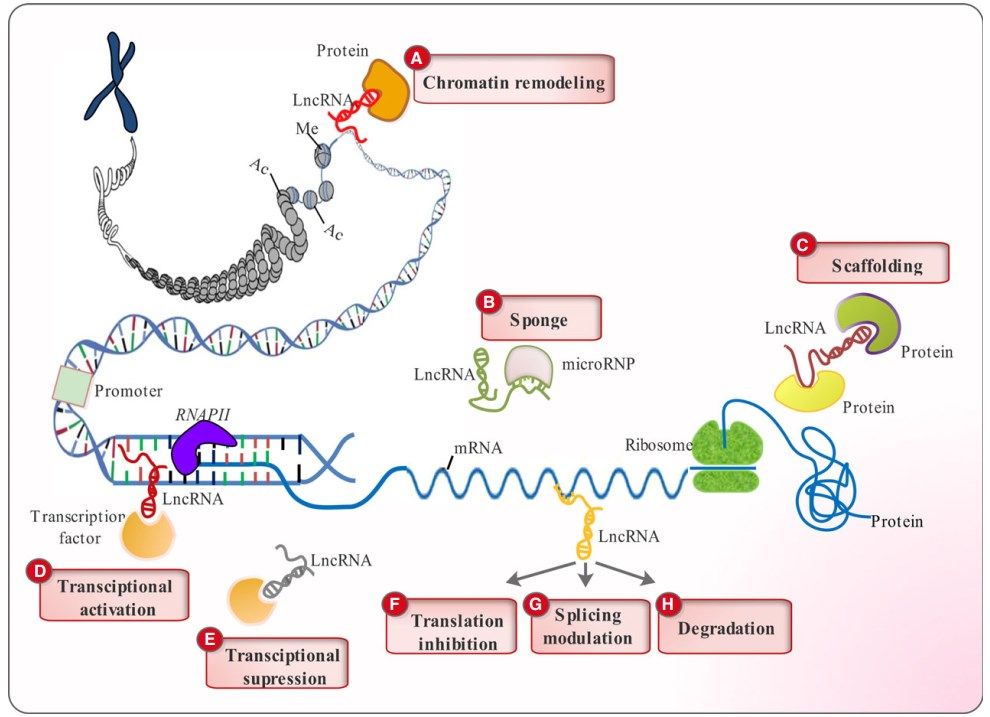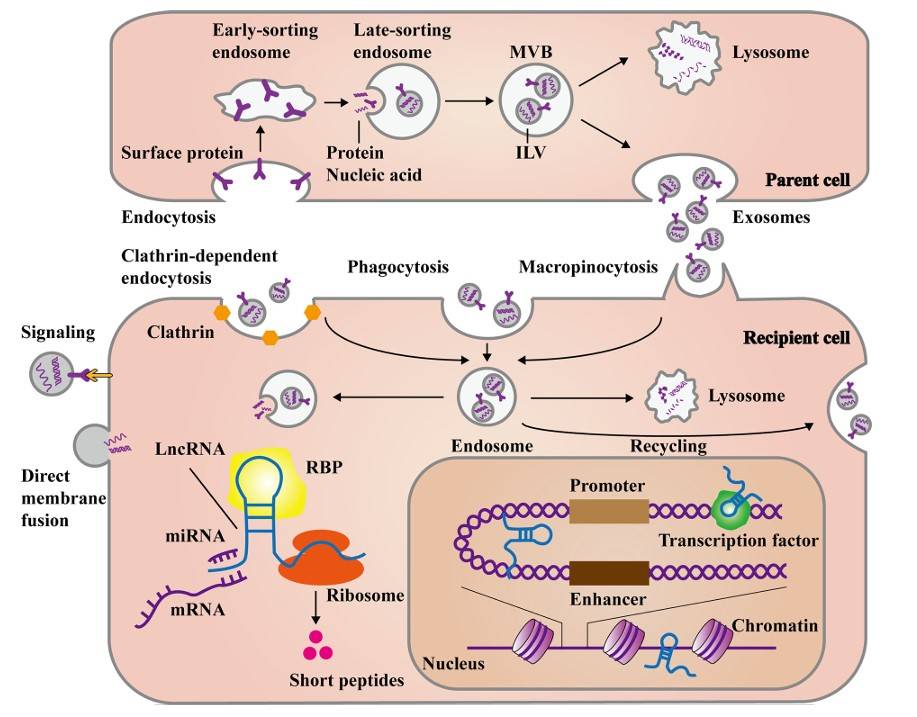Exosomal lncRNA Sequencing Service
Overview Services Features FAQs
Exosomal lncRNAs have been shown to have significant roles in drug resistance and human carcinogenesis, and they offer a lot of promise for use as invasive diagnostic and prognostic indicators for cancer. Based on the advanced technologies and experienced expert team, Creative Biolabs is happy to provide high-quality exosomal lncRNA sequencing services to customers all through the world.
The Importance of Exosomal lncRNA
Long non-coding RNA (lncRNA) is an important category of non-coding RNA with lengths over 200 nucleotides and lacking protein-coding potential. Diverse types of lncRNAs have been discovered and annotated, such as mRNA-like intergenic transcripts, long intronic ncRNAs, antisense RNAs, promoter-associated long RNAs, etc., all of which are implicated in a range of physiological processes and diseases. lncRNA serves as a critical regulator in DNA replication timing, gene transcription, post-transcriptional mRNA processing, and chromosome stability. Recent studies indicated that lncRNA also is an important player in the pathogenesis of human diseases, especially in cancers.
 Fig.1 Classification of lncRNA functions.1, 3
Fig.1 Classification of lncRNA functions.1, 3
Exosomes are rich lncRNA reservoirs. Increasing studies indicated that exosomal lncRNAs are promising and useful biomarkers in chronic inflammations and cancers, due to their higher level, RNase resistance, and tissue-specific expression. Dysregulation of lncRNAs exhibits adverse impacts on cellular functions. The fact that aberrant expression of lncRNAs plays critical roles in tumorigenesis, cancer development, metastasis, and drug resistance has been widely reported. Thus, lncRNAs, particularly tissue-specific exosomal lncRNAs, hold great potential as powerful biomarkers for invasive diagnosis and prognosis of various cancers, such as glioblastoma, breast cancer, liver cancer, and so forth. lncRNAs will be rapidly and precisely profiled and analyzed by RNA isolation, library preparation, high-throughput sequencing, and bioinformatics analysis. Then, the difference and potential lncRNA markers could be identified by comparing and analyzing the exosomal lncRNA from the control group and individuals with cancers.
 Fig.2 The main process of exosomal lncRNAs formation and release.2, 3
Fig.2 The main process of exosomal lncRNAs formation and release.2, 3
Exosomal lncRNA Sequencing Services Provided by Creative Biolabs
With the strong strength of technology platforms and abundant experience in the exosome field, Creative Biolabs has established a sound service system to provide better and more comprehensive products and services for exosome research.
-
Sample Collection and Preparation: Our team will perform extraction, quantification, and quality control of your various types of samples.
-
Library Construction: We construct high-quality sequencing libraries tailored to capture exosomal lncRNA efficiently.
-
Sequencing: lncRNAs are sequenced on our next-generation sequencing platforms to achieve optimal coverage and depth.
-
Data Analysis: Comprehensive bioinformatics analysis is conducted to interpret the sequencing data, identifying key lncRNA species and their potential functional roles.
-
Reporting: We provide a detailed, user-friendly report that includes all data, analysis results, and expert insights.
Features
-
Highly advanced and special SuPrecision™ Sequencing Platform.
-
Highly qualified service as the premise.
-
Expert scientists with expertise in next-generation sequencing.
-
Personalized service tailored to meet various research needs.
Please inquire about Creative Biolabs for more detailed answers to your questions.
FAQs
Q: How much sample is required for the sequencing process?
A: The required sample volume depends on the type of sample and the expected exosome yield. Typically, we can accommodate larger or smaller volumes based on your project needs.
Q: What kind of information will I receive from the sequencing results?
A: You will receive a comprehensive report that includes:
• A list of identified exosomal lncRNAs
• Differential expression analysis
• Novel lncRNA identification
• Pathway and functional analysis
• Raw sequencing data and processed results
Q: How long does the exosomal lncRNA sequencing process take?
A: The turnaround time typically ranges from 8-12 weeks, depending on the complexity of your project and the number of samples.
Q: What is the cost of exosomal lncRNA sequencing services?
A: The type and quantity of samples, as well as the degree of isolation and sequencing that is necessary, all affect the cost. We will provide an extensive estimate customized to your unique project requirements.
References
-
Salehi, Saeede, et al. "State of the art technologies to explore long non‐coding RNAs in cancer." Journal of cellular and molecular medicine 21.12 (2017): 3120-3140.
-
Han, Shenqi, et al. "Exosomal long non-coding RNA: Interaction between cancer cells and non-cancer cells." Frontiers in oncology 10 (2021): 617837.
-
Under Open Access license CC BY 4.0. The image was modified by revising the title.
For Research Use Only. Cannot be used by patients.
Related Services:

 Fig.1 Classification of lncRNA functions.1, 3
Fig.1 Classification of lncRNA functions.1, 3
 Fig.2 The main process of exosomal lncRNAs formation and release.2, 3
Fig.2 The main process of exosomal lncRNAs formation and release.2, 3









